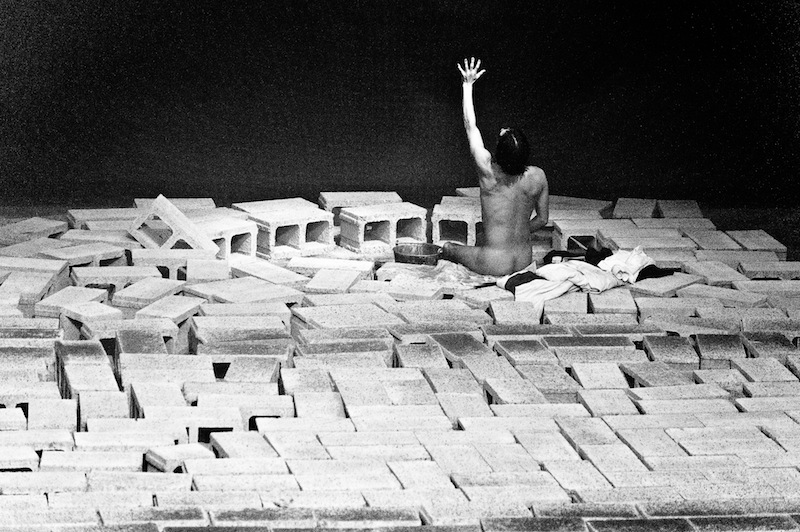The curtain rises onto a wall that totally blocks the view. A long silence... then, without warning, the wall collapses – to cheers of delight from the audience. For the rest of the evening, the dancers have to pick their way over rubble strewn across the middle ground that restricts free movement to strips of open space at the front and rear of the stage.
 It's a powerful metaphor for a society constrained by its past as well as its present; and Sicily is littered with the remains of civilisations that have disappeared leaving behind buildings stricken by earthquakes, swallowed by lava or vanquished by war. And like the feral cats that make their home on the island in the ruins of Greek and Roman temples, the dancers skitter about among the rubble. But whether it is due to the dead hand of history, the ubiquitous threat of Mafia violence or the stifling influence of the church, the late Pina Bausch’s meditation on the city of Palermo seems permeated by a sense of fatalism.
It's a powerful metaphor for a society constrained by its past as well as its present; and Sicily is littered with the remains of civilisations that have disappeared leaving behind buildings stricken by earthquakes, swallowed by lava or vanquished by war. And like the feral cats that make their home on the island in the ruins of Greek and Roman temples, the dancers skitter about among the rubble. But whether it is due to the dead hand of history, the ubiquitous threat of Mafia violence or the stifling influence of the church, the late Pina Bausch’s meditation on the city of Palermo seems permeated by a sense of fatalism.
Nothing is spelled out, of course; stocking masks are worn, guns bandied about and tomatoes blasted to bits, but no-one actually gets shot. Church bells toll and a locker and electric fan stand in for a confessional box and crucifix, but no priests are in evidence or religious processions held. Yet those living in the ruins (pictured above right) seem stricken by a deep-rooted impotence. In one sequence, they parade towards the audience to music resembling a funeral dirge; on their heads they balance apples – emblems of original sin – which, along with their linked arms, limit their movements to a slow shuffle, as though united in self-censorship.
 Men repeatedly scurry about doing the bidding of women whose anguish and self-loathing cannot be alleviated, so failure is inevitable. Kansas Joe McCoy’s song “Why Don’t You Do Right?" (see video overpage) provides the soundtrack for the bizarre opening sequence (pictured left) in which Julie Shanahan barks orders at two men. “Take my hand, Damiano.” “Hug me.” “Hug me more.” “Kiss me, Fernando,” she cries with increasing desperation, as they rush about trying to satisfy her every whim. One hands her a plate of dirt which she flings over herself; she crumples and they pick her up like a cardboard cut-out. They pelt her with tomatoes as she yells. “More, more; in my face, more, more.” Finally they lead her off as if she were an invalid or a madwoman.
Men repeatedly scurry about doing the bidding of women whose anguish and self-loathing cannot be alleviated, so failure is inevitable. Kansas Joe McCoy’s song “Why Don’t You Do Right?" (see video overpage) provides the soundtrack for the bizarre opening sequence (pictured left) in which Julie Shanahan barks orders at two men. “Take my hand, Damiano.” “Hug me.” “Hug me more.” “Kiss me, Fernando,” she cries with increasing desperation, as they rush about trying to satisfy her every whim. One hands her a plate of dirt which she flings over herself; she crumples and they pick her up like a cardboard cut-out. They pelt her with tomatoes as she yells. “More, more; in my face, more, more.” Finally they lead her off as if she were an invalid or a madwoman.
Later, by repeatedly kicking a man’s backside, another woman forces him to empty out his pockets. A man worships at the feet of a beauty queen; finally the adoration makes her snap. “Just look at yourself, you look ridiculous; you look like an idiot,” she yells while doing a handstand at the back of the stage. The women apparently dominate and the men are stooges, but they pay a high price for their bullying dependence – of frustration and passivity.
 There follows a long series of vignettes tinged with black humour. A woman in black is helped on by her bodyguards. She tucks a bottle of water between her legs, unscrews the cap and pees out the contents, shaking off the drips before being led away again. A meal laid neatly on a tablecloth is eaten by a shaggy dog; lying across the feet of six men (pictured below), a prone woman is gingerly carried along; a man cuts strips of flesh from his arm, fries them on an iron and eats them, before doing breast-stroke as a woman pours water over him; a man lifts a woman in a green dress and she falls out of it – naked.
There follows a long series of vignettes tinged with black humour. A woman in black is helped on by her bodyguards. She tucks a bottle of water between her legs, unscrews the cap and pees out the contents, shaking off the drips before being led away again. A meal laid neatly on a tablecloth is eaten by a shaggy dog; lying across the feet of six men (pictured below), a prone woman is gingerly carried along; a man cuts strips of flesh from his arm, fries them on an iron and eats them, before doing breast-stroke as a woman pours water over him; a man lifts a woman in a green dress and she falls out of it – naked.
The ideas may be delightful, but like one of those oriental banquets whose seemingly endless stream of exquisite delicacies sends you home hungry, these non-sequiturs ultimately left me feeling dissatisfied. The mixed messages they broadcast are also confusing; individually they are extremely entertaining, but collectively they paint a bleak picture of a backward society. The women wear dresses from the 1940s and Palermo, Palermo feels like going back in time to when people’s actions were governed largely by dogma, superstition and rigid social mores. The piece contains very little dance and, when it comes, it consists mainly of joyless, folk and gypsy-inspired ensembles performed to gypsy music.
After apocryphal stories and old wives' tales, poems and lots of schmaltzy music including “Stormy Weather” and the "Moonlight Sonata”, the evening ends with a fairy story about a field of geese threatened by a fox, who persuade him to delay killing them while they pray. They continue to pray until this day (kept alive by their faith, which involves intoning the nonsensical sounds “Gah, gah, gah”) and, for all I know, Sicilians are still staving off the inevitable by muttering Hail Marys and paying off the Mafia.
Watch Peggy Lee perform "Why Don't You Do Right?"














Add comment